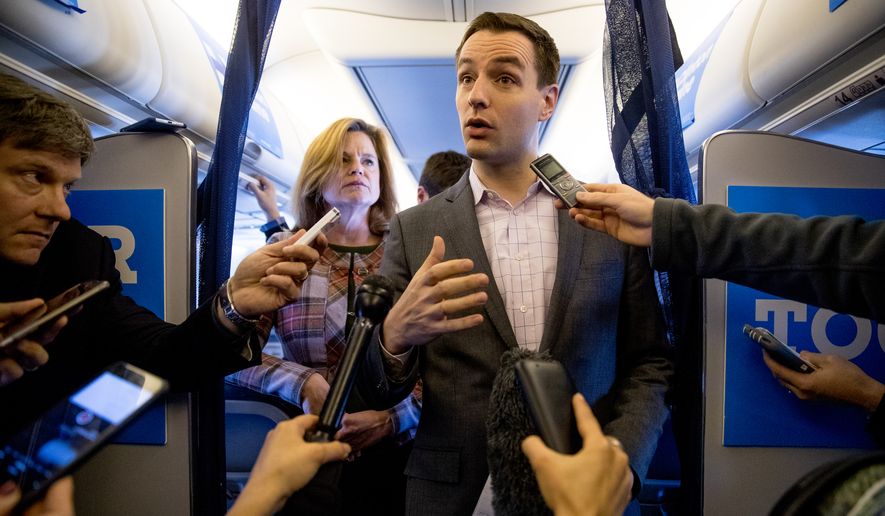Hillary Clinton personally approved sharing with the news media a false theory linking Donald Trump to Russia even though campaign officials were not “totally confident” in the accuracy of the information, the manager of her 2016 campaign testified in court.
The bombshell was revealed during the cross-examination of Robby Mook, who managed Mrs. Clinton’s unsuccessful 2016 presidential campaign against Mr. Trump.
While on the stand in the trial of former Clinton campaign attorney Michael Sussmann, Mr. Mook detailed to jurors his conversation with Mrs. Clinton in the final weeks of the 2016 campaign.
“I discussed this with Hillary as well,” Mr. Mook testified Friday. “The discussion is that ‘Hey, we have this, and we want to share this with a reporter.
“She agreed to that,” he said.
The testimony provided the first evidence of Mrs. Clinton’s direct involvement in promoting Trump-Russia conspiracy theories during the 2016 presidential campaign. The involvement of the Clinton campaign is the linchpin of the case against Mr. Sussman, who is accused of lying about who his employer was when he went to the FBI in September 2016 with a false story about Mr. Trump’s secret communications with Russia’s Alfa Bank.
It is the first trial stemming from special counsel John Durham’s probe into the origins of the FBI’s investigation of Trump-Russia collusion to sway the 2016 presidential election.
In other testimony last week at the federal courthouse in the District of Columbia, two former CIA officials said Mr. Sussman peddled his false theories to the CIA shortly after Mr. Trump was sworn in as president.
Retired CIA officer Mark Chadason told jurors that he met with Mr. Sussmann for breakfast at a Northern Virginia hotel on Jan. 31, 2017. He said Mr. Sussmann claimed he represented “an engineer with a number of patents” and “a Republican” who had some anti-Trump accusations.
He described Mr. Sussmann as appearing “frustrated” and threatened to take his claims to The New York Times if the CIA wasn’t interested.
Mr. Sussmann told the CIA agent that he had spoken with the FBI but said investigators did not “handle the matter well” and lacked the technical expertise to review the accusations, according to the testimony.
Still, the CIA officials said they told him information should have been forwarded to the FBI and that would be the best agency to investigate his claims.
During Mr. Mook’s testimony, he said the now-debunked tale about the Trump Organization having secret communication with Alfa Bank was widely discussed within the campaign. He spoke about it with campaign chair John Podesta, former communications director Jennifer Palmieri and senior campaign aide Jake Sullivan, who is now President Biden’s national security adviser.
Mr. Mook said Mrs. Clinton approved passing off the story to a reporter, even though they had not vetted the accuracy of the information.
“Part of the point of giving it to a reporter was they could run it down further,” he said. “A reporter could vet the information and then decide to print it.”
The revelations prompted U.S. District Judge Christopher R. Cooper to clear the jury from the room and hold a sidebar discussion with the prosecutors and defense attorneys.
Despite the Clinton campaign’s willingness to share the theory with the press, Mr. Mook didn’t view the Alfa Bank accusations as “a silver bullet” against Mr. Trump because the campaign didn’t understand the claims.
“It was certainly alarming and suspicious. We didn’t know what this data going back and forth was,” he said.
Prosecutors have told the jury that Mr. Sussman, on behalf of the Clinton campaign, “used and manipulated the FBI” with dirt on Mr. Trump to create an October surprise before the election. The plan, they said, was to get the FBI to probe the Alfa Bank ties, allowing the campaign to pitch stories about it to the news media.
Prosecutors say Mr. Sussmann told FBI General Counsel James A. Baker that he was not handing over the information on behalf of any client.
Defense attorneys counter that Mr. Sussmann did not lie and his ties to the Clinton campaign were well known to Mr. Baker and the FBI.
Mr. Sussmann has pleaded not guilty to one charge of lying to the FBI, which carries a five-year prison sentence.
Mr. Mook said he absolutely would not have wanted Mr. Sussmann to take the claims to the FBI.
“We didn’t trust the FBI,” he said. “From a purely analytic standpoint, the two or three most damaging days of the campaign were caused by [former FBI Director] James Comey, not by Donald Trump.”
He said he was not aware of Mrs. Clinton or any other campaign official authorizing Mr. Sussmann to bring the accusations to the FBI.
Mr. Mook also read from an Oct. 31, 2016, tweet from the Clinton campaign promoting the Alfa Bank accusations after they were published in a Slate magazine article.
The tweet included a statement from Mr. Sullivan, who called the claims “the most direct link yet between Donald Trump and Moscow.”
Mr. Sullivan, who has come under fire for his role in promoting the Alfa Bank accusations, said the communications were a “secret hotline that may be the key to unlocking the mystery of Trump’s ties to Russia.” He also said voters “can only assume federal authorities will now explore this direct connection between Trump and Russia as part of their existing probe into Russia’s meddling in our elections.”
The prosecution is expected to wrap up its case Tuesday after testimony from Bill Priestap, a former assistant director of the FBI’s counterintelligence division, FBI lawyer Tisha Anderson, a Perkins Coie billing expert, and DNC operative Tom McMahon.
The defense will then present its case, which includes a long witness list that could extend the trial past Memorial Day.
Correction: A previous version of this article incorrectly reported FBI General Counsel James A. Baker’s last name.
• Jeff Mordock can be reached at jmordock@washingtontimes.com.




Please read our comment policy before commenting.